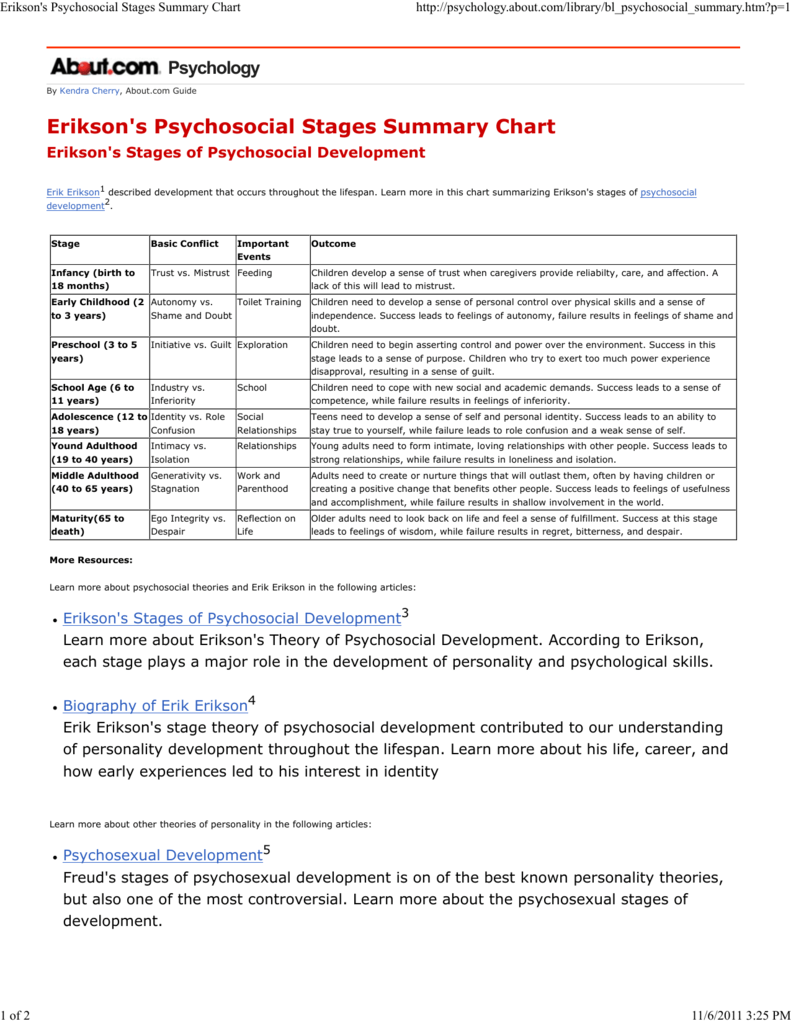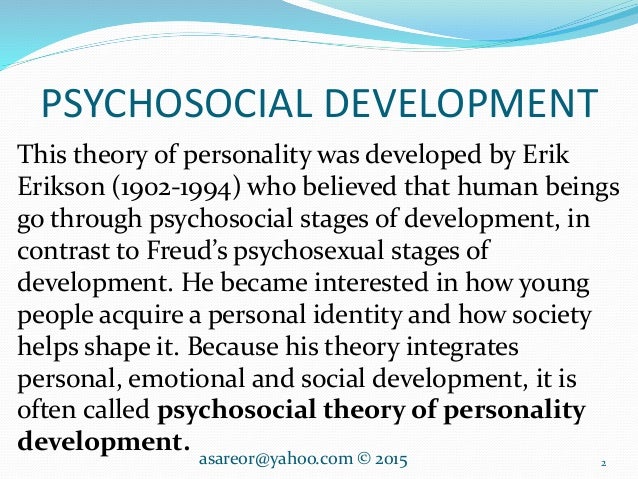It is one of the major child development theories that has influenced our understanding of how kids develop through childhood and later life. The other is understanding how the various parts of a person come together as a whole.
 Erikson S Psychosocial Stages Summary Chart
Erikson S Psychosocial Stages Summary Chart
Erik Erikson like Sigmund Freud believed that personality developed in a series of stages.

How is personality developed according to psychosocial. Ego identity is the conscious sense of self that we develop through social interaction and becomes a central focus during the identity versus confusion stage of psychosocial development. Psychosocial development is just a fancy phrase that refers to how a persons individual needs psycho mesh with the needs or demands of society social. Erikson on the other hand focused on psychosocial development.
McCrae Costa 2008 is one of the grand theories of current personality psychology. According to Erikson our ego identity constantly changes due to new experiences and information we acquire in our daily interactions with others. By Saul McLeod updated 2018 Erikson maintained that personality develops in a predetermined order through eight stages of psychosocial development from infancy to adulthood.
According to Carl Rogers theory of personality development an essential component of continued growth is to experience and accept the authentic self Rogers 1959 1961. Eriksons psychosocial theory of development considers the impact of external factors parents and society on personality development from childhood to adulthood. According to Eriksons theory every person must pass through a series of eight interrelated stages over the entire life cycle The eight stages of development are.
During each stage the person experiences a psychosocial crisis which could have a positive or negative outcome for personality development. Psychosocial Stage 1 - Trust vs. This means achieving a sense of trust in ones ideas and impulses rather than denying or constantly disapproving of them.
According to Freud the basic driving force of personality and behavior is known as the libido. This was Eriksons number one theory. Erik Eriksons 1958 1963 psychosocial development theory proposes that our personality develops through eight stages from infancy to old age.
The study of personality focuses on two broad areas. Mistrust The first stage of Eriksons theory of psychosocial development occurs between birth and one year of age and is the most fundamental stage in life2 Because an infant is utterly dependent the development of trust is based on the dependability and quality of the childs caregivers. Five-Factor Theory and personality development Five-Factor Theory FFT.
He argued that social experience was valuable throughout life with each stage recognizable by the specific conflict we encounter between our psychological needs and the surrounding social environment. The id the ego and the superego. This libidinal energy fuels the three components that make up personality.
In his most influential work Childhood and Society he divided the human life cycle into eight psychosocial stages of development. Its foundations are built on empirical evidence and the interpretation of this evidence is guided by some time-tested hypotheses from earlier theorists such as Allport Cattell and Eysenck. From birth a child creates an emotional repertoire tied to her perceptions of her worlds safety.
One is understanding individual differences in particular personality characteristics such as sociability or irritability. Socialization is the process by which the individual infant acquires the behavioural potentialities and eventually those behaviour patterns that are customary and acceptable according to the standards of his family and the social group. She proposes that our personalities develop around basic needs and she begins by documenting the three basic psychological needs we all come with.
According to Erikson a person passes. The ultimate aim of personality development is the development of social behaviour in children. Thus personality development is both an individual and a social phenomenon.
Each stage is characterized by a psychosocial crisis of two conflicting forces. The need to predict our world the need to build competence to act on our world and because we are social beings the need for acceptance from others. The fundamental difference between them is that Freud based his theory on a series of psychosexual stages.
Erikson believed that childhood is very important in personality development and unlike Freud felt that personality continued to develop beyond five years of age. Freud not only theorized about how personality developed over the course of childhood but he also developed a framework for how overall personality is structured. The young adult for instance is expected to enter into an institution ie marriage and familythat will perpetuate the society.
Building on a two-stage process proposed by Piaget Kohlberg expanded the theory to include six different stages. Eriksons theory of psychosocial development is an eight-stage theory that describes how personality develops and changes throughout the course of the entire lifespan. Social interaction shapes personality development according to Danish psychoanalyst Erik Eriksons theory of psychosocial development.
In the view of Erik Erikson certain psychosocial demands or crises confront the individual at distinct intervals throughout life. Kohlbergs Stages of Moral Development Lawrence Kohlberg developed a theory of personality development that focused on the growth of moral thought. Adapted from the Encyclopedia of Psychology.